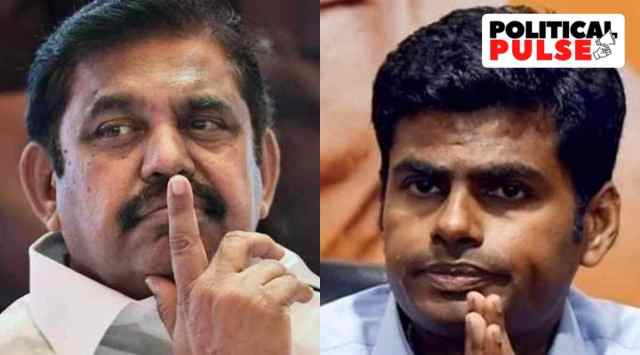Behind AIADMK-BJP flare-up: EPS search for a narrative, Annamalai aggression, conflicting interests
13 BJP leaders have defected to AIADMK in four days with EPS himself inducting them, which has sparked the question whether their alliance would last for 2024 Lok Sabha polls.
 AIADMK leader Edappadi K Palaniswami (Left) and Tamil Nadu BJP president K Annamalai (Right) (File)
AIADMK leader Edappadi K Palaniswami (Left) and Tamil Nadu BJP president K Annamalai (Right) (File) The rising tension in its alliance with the AIADMK in Tamil Nadu seems to have become a cause for concern for the BJP ahead of the 2024 Lok Sabha polls.
A total of 13 BJP leaders of varying seniority have defected to the AIADMK over the last four days, sparking the question in state political circles whether their alliance would last for the Lok Sabha election, which is barely 13 months away.
All eyes are on the perceived transformation of AIADMK chief and ex-chief minister Edappadi K Palaniswami or EPS, who has been himself taking the lead in welcoming the BJP defectors into his party fold while remaining unfazed over its implications for their alliance. It is another matter that the BJP has drawn accusations of exerting “undue influence” over its senior ally for years.
EPS emerged as the sole principal leader of the AIADMK following the Supreme Court’s February 23 decision to dismiss his party rival O Panneerselvam or OPS’s petition and uphold a Madras High Court order allowing the former to continue as the party’s interim general secretary.
A key reason behind EPS’ move to spearhead his party’s bid to “poaching” the BJP leaders is apparently to form a narrative that he is no longer “at the mercy” of the BJP. A senior BJP leader said EPS’ “assault mode” stemmed from the point that despite being one of the leading Dravidian parties the AIADMK has been devoid of any narrative for some time.
While the DMK has been ruling the state and projecting its narrative in the form of “good governance” and the fight against the BJP or fascism, the state BJP has been showcasing the Narendra Modi-led central government’s “accomplishments” and welfare policies for women and weaker sections.
“So, what is there for AIADMK. Almost nothing,” the BJP leader said. “That was also the case in the recent Erode East bypoll (where the AIADMK was trounced by the Congress). They didn’t have a single reason to seek people’s votes.”
They AIADMK no longer has a unique identity it had when its former supremo late J Jayalalithaa was alive. After the death of its charismatic leader in December 2016, the AIADMK, which used to have 5-10 per cent of core Hindu votes, is no longer seen as a “nationalistic” voice. The party has also lost the support from a significant section of the minorities too. The party plunged into a crisis following OPS’ power play in January 2017, which it has still not recovered from.
Jayalalithaa’s departure left a massive leadership vacuum in the party. Known for her tough stand against radical and terrorist groups, she would have been possibly the first state Opposition leader to take up the recent Coimbatore car blast to corner the DMK government. However, what actually happened now was that instead of the AIADMK leaders it was BJP chief K Annamalai who raked up this issue in a bid to reach out to the Hindu nationalist vote bank.
The AIADMK’s leadership has not missed the point that the BJP’s gaining ground in Tamil Nadu has been marked with a shift in a section of its Hindu support base to the BJP in several rural and urban pockets. A large number of BJP cadres and supporters are also relatively younger than their AIADMK counterparts, which seem to be accelerating it.
“It is not about the BJP growing faster in Tamil Nadu, nor will it happen in the next decade, but about them eating away at the AIADMK’s vote base which does not have any motivating reason to hold back,” said a former AIADMK minister, who is gradually withdrawing from active politics. “In 1970s, 80s, 90s or even until a decade ago, an average youth from the Hindu majority or the minority communities had reasons to vote for AIADMK. Is there a reason now?” he asked.
Observers say that both the BJP and the AIADMK have also known it for a long time that given their overlapping support bases and interests, their collision is inevitable.
Another major reason cited by the EPS camp for the toughening of its stance towards the BJP is the perceived “contradictions” in their positions on various issues. While his party’s stance on the National Education Policy, NEET, and the two language policies put it on the opposing side of the BJP, EPS is still forced to remain committed to his party’s alliance with the BJP.
“When Jayalalithaa was alive, no one from AIADMK dared to join the BJP. However, since her death, many of their leaders have joined our party. When Jayalalithaa was alive, a top BJP leader joining AIADMK might have been done in the presence of Jayalalithaa. But in the last few days, many third or fourth-rank BJP office-bearers are being inducted into the AIADMK by EPS himself. That shows he is desperate, panicked and that he has lost discretion in keeping up his own stature,” said a senior BJP leader.
Several state BJP leaders said they saw it coming, with one of them holding that he predicted “EPS’ assault on BJP” even before the Erode East bypoll results. “The by-election shows that the AIADMK was struggling to find its feet,” he said.
Another question that arises is, how worried the saffron party is over its deteriorating relationship with its major Dravidian ally. Although the BJP, which rules the Centre, has softened its approach towards the AIADMK in recent months, it is said to be counting on the latter’s “dependence” on the party on various matters for their alliance to remain afloat.
There has been a buzz that the AIADMK leaders have been wary of a crackdown by central agencies on some of them who have been under the cloud in connection with disproportionate assets cases and other matters.
There has also been a worry in the ranks of both the allies that if they do not stick together, it may lead to the DMK “poaching” the leaders from both the camps.
The BJP’s game plan in Tamil Nadu seems to be mirroring the Naam Tamilar Katchi (NTK) leader Seeman’s moves. While Seeman, a Tamil nationalist, uses a Tamil narrative to capture the imagination of a segment of the people, the state BJP led by Annamalai has been trying to build a “Dravidian-style saffron party”. Both Seeman and Annamalai have been aggressively engaged in raising issues concerning women, Dalits, and other vulnerable groups, in the hope that a significant segment of them would gravitate towards their parties one day.
Upset by the AIADMK’s alleged poaching of his party leaders, Annamalai, a former IPS officer, asserted, “I want to work as a leader, not a manager. I intend to run this party (BJP) in the manner J Jayalalithaa and K Karunanidhi ran their parties. I can’t help if that upsets a section in my party.”
Given the fact that Tamil Nadu has been ruled by regional parties for over five decades, the national parties have always chosen to pay second fiddle to their Dravidian allies in the state. Annamalai might be trying to change this old equation as he makes an aggressive bid to outperform the main Opposition party on various issues, thereby forcing EPS to hit back in order to assert his leadership and his party’s identity.
- 01
- 02
- 03
- 04
- 05































